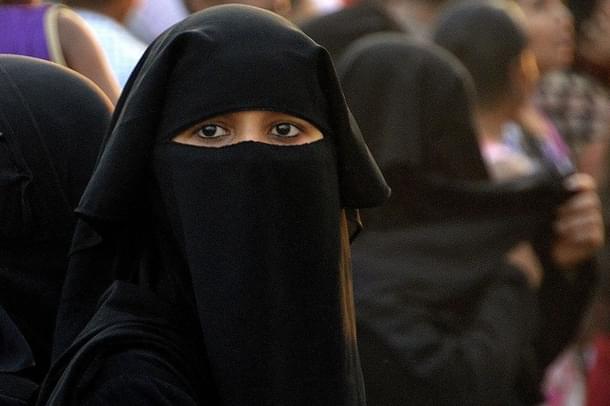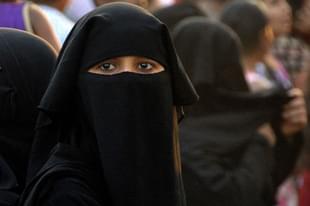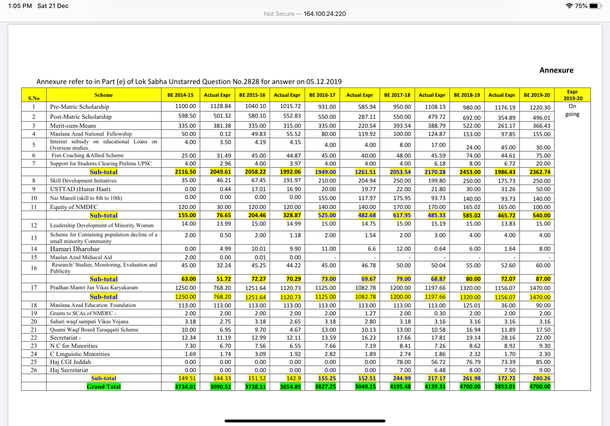Ideas
‘Secularism’: Modi Government Spent Rs 22,000 Crore On Minority Welfare, Gave 3.2 Crore Scholarships; Muslims Biggest Beneficiaries
Arihant Pawariya
Dec 22, 2019, 03:12 PM | Updated Dec 23, 2019, 10:01 AM IST
Save & read from anywhere!
Bookmark stories for easy access on any device or the Swarajya app.


India’s Muslim minority has been outraging for days now, often times violently on the streets, at the Citizenship Amendment Act (CAA) passed by the Parliament which intends to fast-track citizenship for religiously persecuted minorities in neighbouring Islamic states of Pakistan, Bangladesh and Afghanistan. They have been joined in their protests by the elite sections of Hindu society as well.
The fundamental opposition to the CAA stems from misplaced paranoia and misinformation, but even if we disregard this chief reason which is motivating an overwhelming majority to pour on to the streets, we are left with a principled stand that some have taken.
They argue that the government shouldn’t give fast track citizenship on the basis of religion. When it comes to CAA, they want that the group which is persecuting be treated at par with the groups being persecuted.
But when it comes to India, these same worthies champion having special rights and protection to religious minorities even when there is no persecution. Unequals can’t be treated as equals, they reason.
Same logic is thrown out of the window when it comes to giving some relief to religious minorities in Islamic states.
To sum up, equality and secularism are desirable when dealing with non-Indians, but these concepts are happily violated while treating Indian citizens.
In the recently concluded Parliament session, the Minister of Minority Affairs revealed that the Modi government has spent Rs 22,000 crore in the past six years on Minority welfare and has awarded scholarships to around 3.2 crore students belonging to minority communities, namely Muslims, Christians, Sikhs, Parsis, Buddhists and Jains.
Since the funds allocated by the Ministry are in proportion of the population of the six groups, Muslims are the biggest beneficiaries by virtue of being the biggest majority among these minorities.
It’s ironic how majoritarianism is playing out in the ministry meant for minorities.
Here is a list of 26 sectarian schemes run by the Ministry of Minority Affairs with detailed expenditures in the last six years:

The total amounts to Rs 22,485 crore (including budgeted expenditure for current fiscal year).
Of the 26 schemes, the highest expenditure is under the head ‘Pradhan Mantri Jan Vikas Karyakram (PMJVK)’. This was earlier known as Multi-sectoral Development Programme (MsDP) and is fully funded by the Central government.
The government has identified Minority Concentration Areas (MCA) in the country where it carries out development works.
The Modi government substantially increased the area covered under PMJVK to 109 Minority Concentration District Headquarters (MCD), 870 Minority Concentration Blocks (MCB) and 321 Minority Concentration Towns (MCT) and Cluster of Minority Concentration Villages (CoMCV).
These 1,300 Minority Concentration Areas are spread over 308 districts of 32 States/UTs where the government has built Residential Schools, New Schools, College Buildings, Student Hostels, Additional Class Rooms, Laboratory Rooms in Schools, Computer Rooms, Toilets, ITIs, Polytechnics, Skill Training Centres, Working Women Hostels, Hospitals, Health Centres, Anganwadi Centres, Drinking Water Projects, Common Service Centres, Sadbhav Mandaps, Market Sheds etc.
These works are over and above the secular projects undertaken by the government in these areas.
Is this equality and secularism at work?
Take scholarships. The Minister informed the Parliament that in the first term of the Modi government, around 3.2 crore students belonging to six Minority communities got scholarships, half of them girls. But those who swear by equality and secularism don’t utter a word at this communal budgeting where poor students from minorities get the scholarships but poor students from the Hindu community don’t only because their religion is different.
Recently, Minister Mukhtar Abbas Naqvi tweeted that his department’s scheme Hunar Haat has ‘proved to be an effective and successful mission to preserve and promote India’s indigenous traditional legacy of master artisans and craftsmen which was on the verge of extinction.’
But what he forgot to add is that this scheme is only for artisans of minority communities. Does this mean that Hindu artisans don’t need to be promoted or their craftsmanship doesn’t need to be saved from being extinct?
While replying to a question in Lok Sabha, Naqvi informed that ‘Hunar Haats’ are organised by this Ministry under “Upgrading the Skill and Training in Traditional Arts/Crafts for Development” (USTTAD) scheme to give an effective platform to minority artisans and culinary experts from across the country to showcase and market their finest handicraft and exquisitely crafted indigenous handmade products.’
Why does the government support and promote only non-Hindu artisans? Where are the cherished ideals of equality and secularism?
Such communal budgeting isn’t just limited to sectarian ministry of Minority Affairs but it is rampant even in secular schemes. For instance, in Pradhan Mantri Awas Yojana, 15 per cent funds are earmarked for religious minorities.
It’s outrageous that the same minorities who get government funds based on their religion are protesting against a law which is aimed at giving refuge to minorities of neighbouring Islamic states which are persecuting them for their identity.
The Indian State has only itself to blame. It’s time that the government actually implemented equality and secularism which the opponents of CAA are clamouring for.
Arihant Pawariya is Senior Editor, Swarajya.





